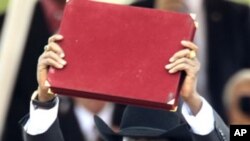JUBA, SOUTH SUDAN —
From six-year-old girls seeking respect for children to adults advocating for pensions to be paid regularly to the elderly, dozens of South Sudanese turned out this weekend to tell the National Constitutional Review Commission what they would like to see included in the country's constitution.
Rhoda Kuong, 6, braved rainy season weather to come to the first meeting held by the commission to hear what South Sudanese want in their constitution. For the young girl, the main issue to tackle was the safety and exploitation of children like her.
"Children are raped and denied education and also they are given hard work to do, hard labor. I don’t want them to forget children’s rights," Kuong said.
Marcelina Denya came to the hearing in Juba to advocate for the rights of the elderly, whom she called "the poorest of the poor."
"They don’t have money... It is now 24 months that the old-age pensioners have never got their little pension and most of them have died because they are unable to contribute even a bottle of water or salt for the house,” she said.
The hearing was the first of what commission officials say will be scores of events aimed at getting citizens in every county in South Sudan over the next three months to tell officials what they want in their constitution.
Commission Chair Akolda Maan Tier said officials hope to talk to as many South Sudanese as possible but acknowledged that there are likely to be roadblocks, mainly the weather, security and language barriers.
“During the rains, it is not easy to travel from one state to the other or even within the state," he said.
"The question of security is also a problem and... many people may not speak English or Arabic... using vernacular languages can be an obstacle."
The commission was scheduled to finish its work at the beginning of this year, but ran out of money. Parliament extended the commission's mandate through December 2014, meaning South Sudan will operate until then -- at least -- under the interim constitution that was in effect when the country gained independence on July 9, 2011.
Tier declined to say whether the commission would extend the campaign if members are unable to get feedback from residents in all of South Sudan's counties within the alotted time.
Rhoda Kuong, 6, braved rainy season weather to come to the first meeting held by the commission to hear what South Sudanese want in their constitution. For the young girl, the main issue to tackle was the safety and exploitation of children like her.
"Children are raped and denied education and also they are given hard work to do, hard labor. I don’t want them to forget children’s rights," Kuong said.
Marcelina Denya came to the hearing in Juba to advocate for the rights of the elderly, whom she called "the poorest of the poor."
"They don’t have money... It is now 24 months that the old-age pensioners have never got their little pension and most of them have died because they are unable to contribute even a bottle of water or salt for the house,” she said.
The hearing was the first of what commission officials say will be scores of events aimed at getting citizens in every county in South Sudan over the next three months to tell officials what they want in their constitution.
Commission Chair Akolda Maan Tier said officials hope to talk to as many South Sudanese as possible but acknowledged that there are likely to be roadblocks, mainly the weather, security and language barriers.
“During the rains, it is not easy to travel from one state to the other or even within the state," he said.
"The question of security is also a problem and... many people may not speak English or Arabic... using vernacular languages can be an obstacle."
The commission was scheduled to finish its work at the beginning of this year, but ran out of money. Parliament extended the commission's mandate through December 2014, meaning South Sudan will operate until then -- at least -- under the interim constitution that was in effect when the country gained independence on July 9, 2011.
Tier declined to say whether the commission would extend the campaign if members are unable to get feedback from residents in all of South Sudan's counties within the alotted time.




